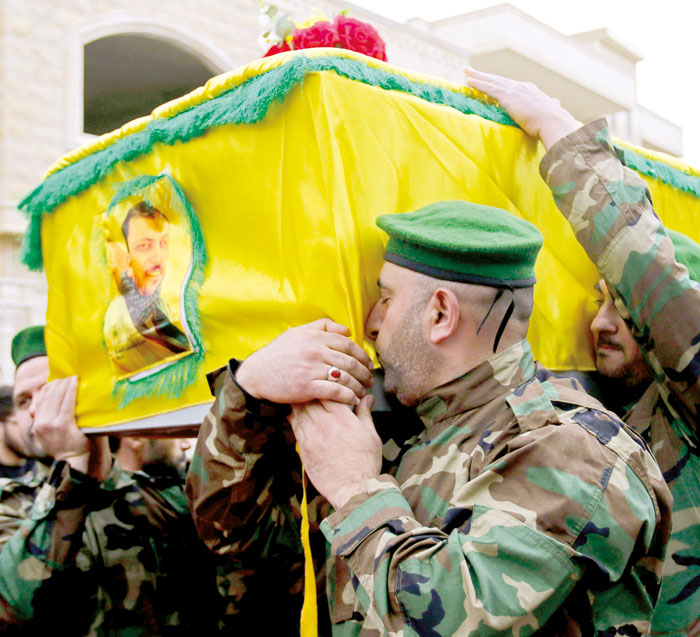Hezbollah’s costly victory in Syria
Ali Alfoneh/ The Arab Weekly
27 سبتمبر 2017

Here’s what Hezbollah leader Sayyed Hassan Nasrallah is reported by Al Akhbar to have said about the Syrian war: “We have won the war in Syria. What remain are only spare battles.” He described “our martyrs, wounded, captives and people” as engaged in a big project. They “are changing equations,” said Nasrallah, “and writing the region’s history, not Lebanon’s.”
He contextualised the fight against the Islamic State (ISIS) and other militant groups, such as Jabhat Fateh al-Sham (JFS, the former al-Nusra Front), as follows: It was “even more serious than the 2006 July war,” the 34-day conflict with Israel.
This is rhetorical acrobatics. The popular uprising against Syrian President Bashar Assad’s regime originally had nothing to do with Islamist radicalism and there was no risk of the Lebanese fighting ISIS or JFS on Lebanese territory. Arguably, the brutal policies of the Assad regime and the deployment of Hezbollah forces in Syria radicalised the Syrian opposition, creating an opportunity for Islamist radicals to emerge as a force in Syria.
And yet Nasrallah was quoted by the Iranian Fars News Agency discussing the importance of the Syrian civil war with Iran’s Supreme Leader Ali Khamenei in apocalyptic terms.
“Back then,” Nasrallah said, referring to the start of the Syrian civil war, “everyone believed the Syrian regime would collapse within two to three months. We explained our viewpoint and said, if we don’t fight in Damascus, we must fight in Hermel, Baalbek, Dahieh, Ghazieh, Western Bekaa and southern Lebanon.”
Khamenei is reported to have responded: “Not only in these areas but also in Kerman, Khuzestan, Tehran and the like… This front has several axes: The Iran axis, the Syria axis and the Lebanon axis. Bashar Assad is the commander of the Syria axis and we must see to it that he prevails and prevail he will.”
It’s not hard to see why Nasrallah resorts to rhetorical acrobatics and historical revisionism. He is finding it difficult to explain the cost of Hezbollah’s military involvement in the Syrian civil war. After all, Hezbollah’s raison d’être is founded on the doctrine of al-Muqawama — resistance against Israel.
Yet, since at least September 2012, the Shia militia has fought fellow Arabs in Syria on Iran’s behalf to secure the survival of the Assad regime and maintain its overland bridge to Tehran.
Worse, there is every indication that Hezbollah’s victory in Syria took a heavy toll. Reports on funerals for Hezbollah fighters killed in combat in Syria, in particular those appearing on www.southlebanon.org and www.yasour. org, show that it was a costly win. At least 1,139 fighters were killed from September 30, 2012, through September 20, 2017. This must be considered a conservative estimate because of Hezbollah’s interest in downplaying its losses in Syria.
Lebanese sources further identify 72 of the fatalities as “al-Qaid al-Shahid,” (martyred leader/commander) or “al-Qaid al-Maydani” (field leader/commander). This indicates they were commanding officers and not rank-and-file fatalities. Hezbollah clearly paid a heavy price in Syria.
So, what did Hezbollah get in return? An overland bridge securing the constant flow of arms from Iran in the east to Hezbollah on the shores of the Mediterranean. This is an important achievement but Nasrallah and the Hezbollah leadership must realise the policy consequences of their achievement. The arms flow will maintain Hezbollah’s dependency on Tehran, forcing it to fight Iran’s future wars to secure future arms deliveries.
 عن أمل جنبلاط المتجدد: لبنان يستحق النضال
عن أمل جنبلاط المتجدد: لبنان يستحق النضال
 صحافيون أم عرّافون!
صحافيون أم عرّافون!
 ماذا يجري داخل أروقة بيت الكتائب المركزي؟
ماذا يجري داخل أروقة بيت الكتائب المركزي؟


 عن الخرائط التي تُرسم والإتفاقات التي تتساقط!
عن الخرائط التي تُرسم والإتفاقات التي تتساقط!
 “الإنحراف في الحياة”/ بقلم كمال جنبلاط
“الإنحراف في الحياة”/ بقلم كمال جنبلاط
 هاشتاغ #صار_الوقت يحل أولاً في حلقة جنبلاط
هاشتاغ #صار_الوقت يحل أولاً في حلقة جنبلاط
 طاولة نقاش عن أزمة الصحافة في جامعة AUST
طاولة نقاش عن أزمة الصحافة في جامعة AUST
 عبدالله: ليظهر لنا وزير مكافحة الفساد حرصه في صفقات البواخر والفيول
عبدالله: ليظهر لنا وزير مكافحة الفساد حرصه في صفقات البواخر والفيول
 عبدالله: غريب أمر وزارة مكافحة الفساد!
عبدالله: غريب أمر وزارة مكافحة الفساد!

 Comment to Uri Avnery: How Sad What Is Looming Ahead
Comment to Uri Avnery: How Sad What Is Looming Ahead
 “Not Enough!”
“Not Enough!”
 … لمن لم يقرأ يوسف البعيني/ بقلم وسام شيّا
… لمن لم يقرأ يوسف البعيني/ بقلم وسام شيّا
 كمال جنبلاط في مولده الأول بعد المائة: تعاليمه وأفكاره ما زالت الحلّ/بقلم عزيز المتني
كمال جنبلاط في مولده الأول بعد المائة: تعاليمه وأفكاره ما زالت الحلّ/بقلم عزيز المتني
 رئيس حزب/ وليس (… سابقاً)/ بقلم د. خليل احمد خليل
رئيس حزب/ وليس (… سابقاً)/ بقلم د. خليل احمد خليل
 التوازن السياسي في لبنان
التوازن السياسي في لبنان
 لبنان… مشاريع انقلابية مؤجلة
لبنان… مشاريع انقلابية مؤجلة
 جنبلاط وحَمَلة أختام الكاوتشوك
جنبلاط وحَمَلة أختام الكاوتشوك
 Le Liban est un symbole de tolérance
Le Liban est un symbole de tolérance
 Our Automated Future
Our Automated Future
 The True Origins of ISIS
The True Origins of ISIS
 Les Misérables vs. Macron
Les Misérables vs. Macron
 عذراً أيها المعلم/ بقلم مهج شعبان
عذراً أيها المعلم/ بقلم مهج شعبان
 رساله الى المعلم / بقلم ابو عاصم
رساله الى المعلم / بقلم ابو عاصم
 إلى روح القائد والمعلم كمال جنبلاط/ بقلم أنور الدبيسي
إلى روح القائد والمعلم كمال جنبلاط/ بقلم أنور الدبيسي
 أسرار وعناوين الصحف ليوم الجمعة 14 كانون الاول 2018
أسرار وعناوين الصحف ليوم الجمعة 14 كانون الاول 2018














